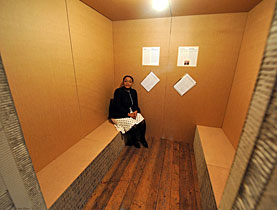Nelson Mandela honoured in Bern

A mock-up of Nelson Mandela's prison cell is among the exhibits on show at a new exhibition in the Swiss capital Bern on the legendary former South African leader.
The Nobel Peace Prize winner and veteran anti-Apartheid campaigner, who turned 90 years old this year, is revered around the world as a symbol of democracy and justice.
“Life and Times of Nelson Mandela” is being presented by the South African embassy in Switzerland, in conjunction with the Political Forum of the Swiss Confederation and Mandela’s own Nelson Mandela Foundation.
The multimedia exhibition, which opens on Thursday at the Käfigturm centre, traces Mandela’s life from the untroubled years of his youth in the Transkei, to his bitter struggle against the Apartheid regime in South Africa and his 27 years in prison.
Through objects, photos and quotes it reveals how, after his release, Mandela paved the way for South Africa’s first free and democratic elections and how as president, he initiated a process of national reconciliation between the black and white populations.
For the South African embassy, the exhibition is a way of expressing its appreciation for Mandela’s contribution.
“For South Africans and for all peoples around the world, he has become the symbol of the triumph of the human spirit over the most adverse of circumstances,” it said in a statement.
“Similarly, his vision, his leadership and commitment to humanitarian causes have been a great source of encouragement for South Africans and the world at large.”
Mandela’s voice
Previously shown in the Palais de Nations, the United Nations head office in Geneva, the exhibition gives the narrator’s voice to Mandela himself, quoting at length from his autobiography “Long Walk to Freedom”.
The format is based on the nine main chapters of his life and includes a replica of his notorious prison cell on Robben Island. He was sentenced to life imprisonment there in 1964 following his activities against the Apartheid government.
Each element includes a mixture of film sequences, interviews, pictures, comic drawings, objects and garments.
The display also encompasses the charismatic Mandela’s life after he stepped down as president in 1999. It includes sections on justice and humanitarian issues, his help in the peace negotiations in Burundi and his efforts to raise awareness of HIV/Aids – which claimed one of his sons and is a huge problem in South Africa.
The organisers hope that the event will appeal to the Swiss sense of democracy – the first talks outside South Africa between the Apartheid government and Mandela took place in the central Swiss city of Lucerne.
“Visual politics lesson”
“The exhibition offers a visual politics lesson for a target audience aged 14 years old and over,” said Simon Haller, the Swiss who developed the exhibition.
“It is very emotional and built around someone that everyone knows,” he told swissinfo.
Apart from the famous chapters of Mandela’s life, the event also delves into the lesser-known episodes, such as his childhood and youth in the Transkei, in the eastern Cape region.
As a young man he refused to marry the bride chosen for him by his tribal leader and went instead to the capital Johannesburg, where he was confronted by the injustices of the Apartheid regime.
He remains today a source of inspiration, especially for young people, said the South African ambassador Konji Sebati at the exhibition preview on Tuesday.
“Mandela’s life story will be told again and again, endlessly, to countless young people,” she said.
swissinfo, based on an article in German by Alexander Künzle in Bern
February 1990: The new South African president F.W. de Klerk bows to pressure by the black population and the international community and ends Apartheid. He frees political prisoners, including Mandela, head of the African National Congress (ANC).
June 8, 1990: Mandela visits Switzerland, meets cabinet minister René Felber.
1993: Worldwide sanctions against South Africa are lifted. Mandela and de Klerk awarded the Nobel Peace Prize.
April 27, 1994: The first democratic parliamentary elections result in victory for the ANC. Nelson Mandela becomes president.
He stepped down as leader in 1999. He was diagnosed with prostate cancer in 2001 and retired from public life in 2004. Since then public appearances have been mostly connected with the Nelson Mandela Foundation, a charitable fund that he founded.
Life and Times of Nelson Mandela runs at the Käfigturm in Bern from October 16, 2008 to January 31, 2009.
It is presented by the South African embassy in Switzerland, in cooperation with the Political Forum of the Swiss Confederation and the Nelson Mandela Foundation.
A series of lectures will accompany the event.
It marks the 90th birthday of the former South African president.

In compliance with the JTI standards
More: SWI swissinfo.ch certified by the Journalism Trust Initiative
You can find an overview of ongoing debates with our journalists here. Please join us!
If you want to start a conversation about a topic raised in this article or want to report factual errors, email us at english@swissinfo.ch.